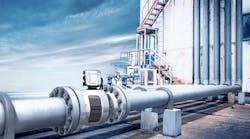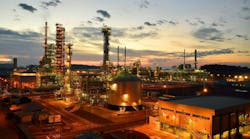Plans to build an offshore/onshore natural gas pipeline in Myanmar have hit a snag after that country's prime minister ordered the scheme's configuration expanded to what project sponsors view as not commercially viable.
Myanmar Premier Gen. Than Shwe ordered that the diameter of the proposed pipeline be increased to 36 in. rather than the 20 in. size planned by a consortium of Total, Unocal Corp., and Mitsui & Co. Industry sources said this would mean the cost of laying the 241-km pipeline from Yadana gas field in the Gulf of Martaban to Yangon (formerly Rangoon) would double from the group's earlier project estimate-prompting objections from the group.
Industry sources said that Myanmar energy and economic planning officials agreed with the consortium's view but do not dare to advise Gen. Than Shwe accordingly. "In that kind of dictatorial rule, officials do not say anything to contradict their leaders, whose wishes are a commandment," said an industry official close to Myanmar authorities on the issue.
Market hurdles
Myanmar's gas demand is not large enough to justify that big a pipeline for many years to come, especially given the fact that two related projects-a 300-MW combined-cycle power plant and a 1,750 metric ton/day fertilizer complex, both near Yangon-have been indefinitely suspended. The original 20-in. gas line was intended to deliver 125 MMcfd of offshore gas to onshore Myanmar under a 30-year supply contract that the Myanmar junta concluded with the Yadana group in February 1995.Under the original plan, the domestic gas line, the power plant, and the fertilizer factory (collectively referred to as the 3-in-1 Project) were to be operational last year. No construction has occurred on these projects, estimated to cost a combined $600-750 million, as the Myanmar economy has worsened in the past few years, partly from the Asian economic downturn and partly from its own political problems, which prevent foreign commercial and assistance capital from flowing into the country.
Thailand's failure to offtake Yadana gas by the contract start-up date of July 1998 is seen as another major contributor for stalling the 3-in-1 Project, as the two main Yadana promoters, Unocal and Total, have not received expected revenues from Yadana gas exports to Thailand. Commercial operation of Yadana gas field is not expected to start until April this year, when the delayed Ratchaburi power plant in Thailand comes on stream. On paper, all these projects, expected to be catalysts for taking Myanmar's economy away from the its current status of a "least-developed country" to a higher level, are classified as "postponed," although some industry analysts doubt they will ever take off. An official with the 3-in-1 Group said, "It will take some time" before the gas line, let alone the power and fertilizer plants, can be realized. In spite of long and protracted negotiations with the Myanmar authorities on the domestic gas line project, the official said, "We have not given up the negotiations yet."
Copyright 1999 Oil & Gas Journal. All Rights Reserved.

